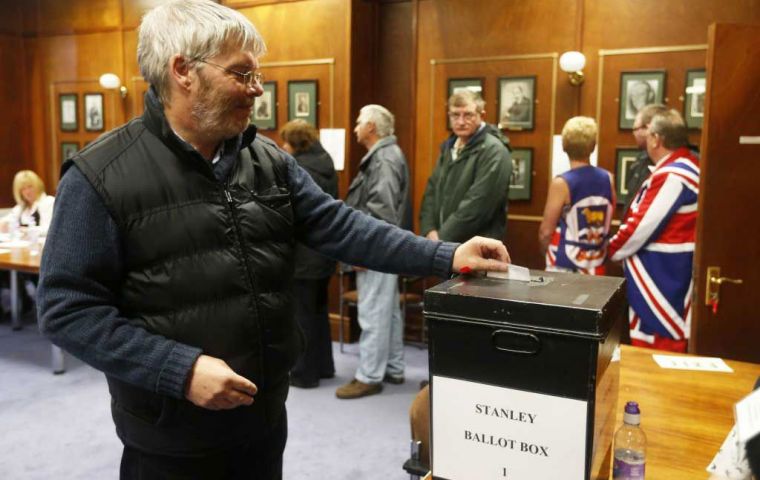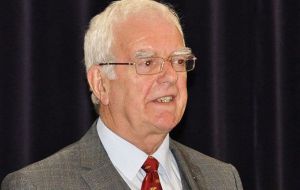MercoPress. South Atlantic News Agency
“Falklands want a normal, friendly relationship with all its neighbors, but...”
 The Falklands' people right to determine their own future was unequivocal, as demonstrated in the March 2013 referendum.
The Falklands' people right to determine their own future was unequivocal, as demonstrated in the March 2013 referendum.  “That result was unequivocal, but unfortunately, Argentina refuses to accept and recognize the result of that referendum,” emphasized MLA Edwards.
“That result was unequivocal, but unfortunately, Argentina refuses to accept and recognize the result of that referendum,” emphasized MLA Edwards. ”We would be delighted to have a normal, friendly relationship with all our neighbors, to freely trade with, work with and discuss things of mutual benefit” said Falkland Islands lawmaker MLA Roger Edwards at the UN Decolonization 2018 Pacific Regional Seminar held in Grenada last week. But, he added, “instead, we are not recognized or accepted as a people in our own right”, by Argentina.
The Falklands' people right to determine their own future was unequivocal, as demonstrated in the March 2013 referendum. “That result was unequivocal, but unfortunately, Argentina refuses to accept and recognize the result of that referendum,” emphasized MLA Edwards.
It had been argued that the Islanders were not a “people” but an implanted British population put there to further Britain’s colonial aspirations, he recalled. Yet, a recent census clearly demonstrated that that was not the case because people from more than 60 ethnic background groups lived and worked peacefully together, having done so for the past 185 years.
MLA Edwards pointed out that the Falkland Islands were now self-financing and had been so since the late 1980s, adding that they did not receive economic aid nor pay any taxes or levies to the United Kingdom. Britain had never relinquished its sovereignty claim and the Islanders had freely demonstrated their wish to remain British.
In reference to Argentina, “we would be delighted to have a normal, friendly relationship with all our neighbors, to freely trade with, work with and discuss things of mutual benefit,” emphasized MLA Edwards.
Argentina's delegate Luis Vernet said the applicability of the standards of self-determination and territorial integrity must consider the specific characteristics of the British colonial enterprise on the Falkland/Malvinas Islands. Recalling that the British had brought their own subjects to the Islands, Vernet emphasized that the issue should not be dealt with like other cases of decolonization. It was the people of Argentina who had suffered, having been expelled through military force and unable to return for some 200 years. The only civilized way to resolve the question was through bilateral dialogue between Argentina and the United Kingdom, he stressed.
The representative of Argentina said the Malvinas Islands, South Georgia Islands and South Sandwich Islands and the surrounding maritime areas remained the subject of an illegal occupation as a result of an act of force perpetuated by the United Kingdom.
The issue was a sovereignty dispute recognized by the United Nations, he said, underlining that the General Assembly was crystal clear in its recognition of the situation as a special and particular case of decolonization.
The Pacific Regional Seminar held in Grenada May 9/11 is held under the auspices of the Special Committee, which is formally known as the Special Committee on the Situation with regard to the Implementation of the Declaration on the Granting of Independence to Colonial Countries and Peoples (also known as the Special Committee of 24 or simply as “C-24”).
The theme of the 2018 Seminar was “Implementation of the Third International Decade for the Eradication of Colonialism: towards the achievement of the Sustainable Development Goals in the Non-Self-Governing Territories: social, economic and environmental challenges”.
The Seminar’s conclusions and recommendations will be considered by the Special Committee at its June substantive session in New York, and subsequently transmitted to the General Assembly.
There are 17 Non-Self-Governing Territories under the purview of the Special Committee: American Samoa, Anguilla, Bermuda, British Virgin Islands, Cayman Islands, Falkland Islands (Malvinas), French Polynesia, Gibraltar, Guam, Montserrat, New Caledonia, Pitcairn, Saint Helena, Tokelau, Turks and Caicos Islands, United States Virgin Islands and Western Sahara. The administering Powers are France, New Zealand, the United Kingdom and the United States.
The 29 members of the Special Committee are Antigua and Barbuda, Bolivia, Chile, China, Congo, Côte d’Ivoire, Cuba, Dominica, Ecuador, Ethiopia, Fiji, Grenada, India, Indonesia, Iran, Iraq, Mali, Nicaragua, Papua New Guinea, Russian Federation, Saint Kitts and Nevis, Saint Lucia, Saint Vincent and the Grenadines, Sierra Leone, Syria, Timor-Leste, Tunisia, United Republic of Tanzania and Venezuela.




Top Comments
Disclaimer & comment rules-

-

-

Read all commentsWhat halucination drug does this Vernet bloke smoke! When were Argentine civilian people ever expelled from the Islands? - answer never. Only military people and their direct families were in 1833.
May 16th, 2018 - 10:05 am +6Several Argentine families live and work peacefully here today. Argentines can enter the islands today with exactly the same permits as issued to British-Chilean or any others - we do not discriminate.
Pot calling the kettle black situation. Argentina insists that Britain colonised the Islands and that we should decolonise . Funny though Argentina in the same vein wants to colonise us so the argument goes round and round. The simple solution to the whole situation is For Argentina to stop it's illegal claim and let the Falkland island people live the life of their choosing. Then everyone could start to build more friendly relationships. Right now the Islanders have no trust in Argentina because their desire and ultimate game is to take our homeland from us even though they know in the eyes of the world it would be colonisation they do not care. Argentina is after the wealth around us nothing more nothing less and when we Islanders have exploited all that wealth their interest will be no more.Getting them to admit that fact is the question often asked.
May 16th, 2018 - 03:36 pm +6The islanders have a right to remain 'freely associated with the UK' their legal right.
May 16th, 2018 - 09:13 am +4Falklands – Freely Determined Political Status (1 pg):
https://www.academia.edu/36555342/Falklands_-_Freely_Determined_Political_Status.pdf
Commenting for this story is now closed.
If you have a Facebook account, become a fan and comment on our Facebook Page!